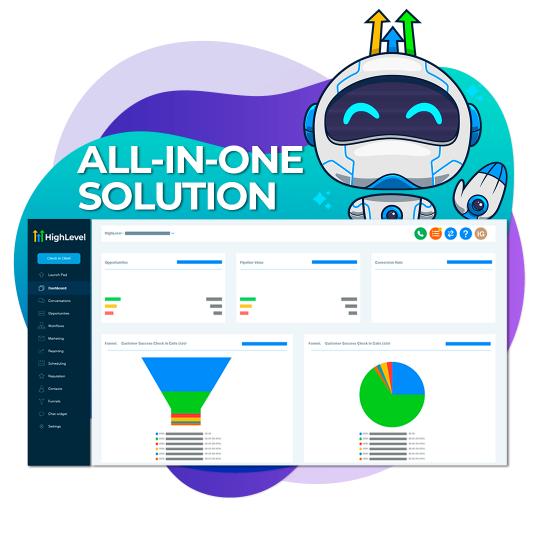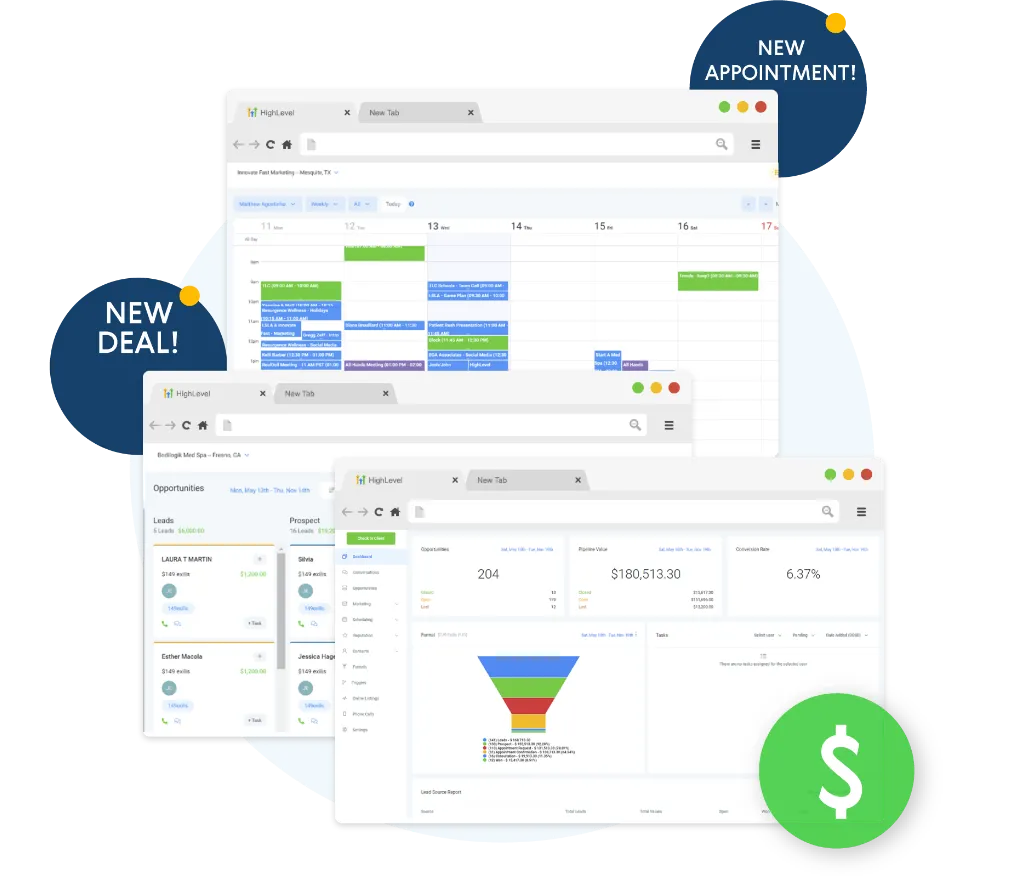We care about making customers happy by being kind and using helpful computer tools. When our team listens well and cares about people's feelings, it makes a big difference. We fix problems fast and try to help before issues come up. Being nice to customers while using smart tools helps them feel good about our company. This makes them want to buy more and tell their friends about us. The best companies know that being friendly and caring, plus having good tools, helps them do better than other businesses.
Feeling overwhelmed by missed leads and disorganized workflows?
Discover the award-winning platform that automates follow-ups, tracks every lead, and keeps your business running smoothly—all in one place. Thousands of businesses are already transforming their sales and marketing with this trusted solution. Don’t miss out—start your 14-day free trial today and click now to uncover exclusive, limited-time special offers!
Understanding Emotional Intelligence in CRM

Let's talk about feelings and how they help us treat customers better. When we care about how customers feel, we can serve them better. This means we:
- Listen with our hearts
- Know our own feelings
- See how others feel
- Build good friendships
- Stay calm when things get hard
Think of it like making friends. We don't just want to know facts about customers – we want to know how they feel.
When we train our workers to care about feelings, customers become happier. They stay with us longer and tell others good things about us.
We can learn what works by asking customers how they feel and watching how they act. This helps us do better each time we talk to them.
The Human Side of Technology
People and computers work together to help customers feel special. When we mix friendly service with smart tools, good things happen. The computer handles the simple stuff. This lets our team spend time helping people with bigger needs.
Many folks want companies to treat them like a real person. But not many companies do this well. We can fix this by using tools that help our team, not replace them. When we train our people to be kind and give them good tools, they can connect better with customers.
We must make it easy for customers to talk to real people when needed. This way, customers know we care about them and want to help.
Ready to simplify your business operations?
Streamline your workflows and boost productivity with a CRM designed to save you time and effort. From tracking leads to automating follow-ups, this platform does it all. Discover what’s possible—learn more about how it works and see why so many businesses rely on it every day.
Measuring Customer Emotions

We care about how our customers feel. We want to know when they're happy or upset.
We use simple tools to listen to them on social media and phone calls. This helps us spot problems early. When customers are sad or angry, we can fix things fast.
We ask them simple questions about their feelings. Their answers help us serve them better.
We track all of this to make sure we're doing a good job making customers happy.
Sentiment Analysis Tools
Sentiment analysis tools help businesses understand how customers feel. These smart tools read customer messages and tell us if people are happy, sad, or angry.
Tools like IBM Watson and SentiSum make it easy to listen to customers across many places – like email, social media, and chat. Let's look at some popular tools:
| Tool | Best For | Key Feature |
|---|---|---|
| SentiSum | Support Teams | Advanced Multichannel Analysis |
| IBM Watson | Enterprise | NLP & Multi-language Support |
| Zoho CRM | SMBs | All-in-one Integration |
These tools can spot when customers need help right away. They also show which marketing efforts work best. The tools use smart computer brains to read feelings in words. This helps businesses give better care to each customer.
With these tools, teams can:
- Find unhappy customers fast
- Make better marketing choices
- Give each customer the right kind of help
- Understand how people feel about their brand
Real-Time Emotional Tracking
We watch how customers feel when they talk to us. This helps us be kinder and better at helping them.
Our tools look at words and feelings in calls, emails, and chats. They spot when someone is happy, sad, or mad. Then our team can help them in the right way.
Smart tools read lots of messages fast. They tell us what we need to know to help customers better. When we know how people feel, we can fix problems before they get big.
This makes each customer feel special. We help them faster because we know what they need right away.
Converting Feelings Into Metrics
Knowing how your customers feel is important. We can turn their feelings into numbers we can measure.
First, we ask customers easy questions about what they think. We give them forms to fill out. They can tell us if they're happy or sad with what we do.
Smart computer tools help us understand what customers say. These tools look at phone calls, messages, and reviews. They show us if customers are happy or upset.
We put customers in groups based on how they feel. This helps us see when feelings change.
When we know how customers feel, we can make things better for them. We can fix what makes them unhappy and do more of what makes them smile.
Still struggling to keep your business organized?
Take the guesswork out of managing leads and follow-ups with a platform trusted by thousands of businesses. Say goodbye to missed opportunities and hello to a seamless sales process. Act now—try it free for 14 days and discover how easy it is to stay on top of your workflow. Don’t wait—exclusive offers won’t last long!
Tech-Enabled Personalization
We use smart tools to make each customer feel special. These tools help us talk to lots of people in a way that feels real.
Our systems watch how people use our website. Then they change what each person sees to match what they like. It's like having a friend who knows just what you need.
Simple Chart:
When people want to feel… Our tools help by…
Seen → Sorting them into groups
Heard → Reading their feelings
Valued → Giving quick answers
Close → Showing things they'll like
Safe → Guessing what they need next
These tools do more than store names and numbers. They help us make real friends with our customers. The computer helps us care for people better, even when we talk to many at once.
The smart system learns what each person likes. This helps us give them a better time when they visit us. It's like having a helper who makes sure everyone gets what they want.
Creating Memorable Customer Experiences

We all like it when someone makes us feel special. When you treat customers like good friends, they spend more money and tell others about you.
To make customers happy, think about how they feel when they talk to you. Be there for them from the first hello to years later.
Listen to what they need. Help them before they ask. Make each person feel one-of-a-kind.
Look at what some shops do: At one coffee shop, a worker learned sign language to talk to deaf customers.
At a steak place, they brought food right to someone at the airport. These small acts made people remember them forever.
Struggling to keep up with your growing business?
Simplify your processes and stay ahead with a CRM that adapts to your needs. Manage leads, automate tasks, and focus on what matters most—growing your business. Take the first step—explore the features today and see how it can transform the way you work.
Mapping the Emotional Journey
We want to know how our customers feel at every step of their journey with us. From the first "hello" to helping them later, each moment matters.
The best and worst moments stick in people's minds the most. It's like making a new friend – some parts of meeting them you'll always remember.
People buy things with both their head and their heart. So when we help customers, we need to be smart and caring at the same time.
Understanding Touch Points Deeply
We need to know how people feel when they talk to our brand. Think of all the times someone comes in touch with your business – when they first hear about you, when they buy something, and after that too.
We look at two kinds of info. First, what people say and write to us. Second, how they feel when they say it. We can see if they're happy, sad, or mad at different times.
Watch for good and bad feelings. See where people smile and where they get upset. This helps us know what we do well and what we need to fix.
Each time someone meets your brand matters. Some times matter more than others. When we know what makes people feel good, we can make their time with us better.
Peak Moments Matter Most
When helping customers, some moments mean more than others. People mostly remember two things: the best (or worst) part and how things end. That's why we need to make these special moments great.
We must be clear and friendly when helping people pick and buy things. We should keep their info safe and not waste their time. When we show we care about the earth, it makes people feel good too.
We can find out what makes people happy by asking them and watching how they feel. This helps us make the best parts of their time with us even better.
Balancing Logic With Heart
We need both facts and feelings to understand our customers better. Think about how a customer feels from start to finish when they deal with us.
Look at the numbers, but also listen to their hearts.
Simple Chart:
- Facts tell us what happens
- Feelings tell us why it matters
- Numbers show results
- Stories show connections
When helping customers:
- Use data to make smart choices
- Show you care about their needs
- Make things easy to use
- Build trust that lasts
Remember: Good business isn't just about cold facts. It's about making people feel good too.
When you mix both, customers stay with you because they trust you and like you.
Think about each time you talk to customers. Make sure you:
- Ask how they feel
- Check the numbers
- Fix problems fast
- Stay friendly
This way, you'll grow strong bonds with customers that last a long time. They'll know you care about them as people, not just as numbers.
Beyond Data and Numbers

People matter more than numbers when we talk to customers. When people feel close to a brand, they keep coming back. Most people pick things from brands they like and trust.
We can now use smart tools to see how people feel about us. These tools help us know when customers are happy or sad. We can ask them simple questions to learn what they think.
When we know how our customers feel, we can talk to them better. We can show them we care. It's not just about getting info – it's about making real bonds.
When we do this right, our customers know we get them and value them.
Digital Empathy at Scale
We care about helping people feel good when they talk to companies online. This means using both smart tools and caring humans to help.
First, we need to see all the ways people talk to us. We want to be there when people need us, no matter how they reach out.
To help more people feel cared for, we do four main things:
- We listen carefully
- We try to know what people need
- We take action to help
- We learn how to do better
Most people want to feel special when they talk to companies. When they don't, it makes them sad or mad.
To make this work, get leaders who care about helping people. Train your team well. Use smart computer tools to help, but keep things friendly and human.
Transforming Negative Customer Interactions

When customers are upset, we can turn things around by really listening and helping them feel better.
Think of it like fixing a friend's problem – first we hear them out, then we work together to make things right. By being kind and fixing issues quickly, those unhappy customers often become our biggest fans.
Our team knows just what to do when someone is upset because we train them to care and solve problems well.
The best part? A customer who starts out mad can end up trusting us even more once we show them how much we care about making things better.
Turn Complaints Into Opportunities
When customers are unhappy, we've a chance to make things better.
Listen closely when they tell you what's wrong. Show them you care by responding fast and being kind.
Help fix their problem in a special way that makes them smile. Ask them how you can make things work better.
Train your team to be good at helping upset customers feel better.
Check back with customers after you fix things. This shows you still care.
When you handle problems well, customers will trust you more and stay with your business longer.
Create Emotional Recovery Plans
When customers feel upset, we need to help them feel better right away. We must listen well and show we care about their feelings. Each customer is special, so we need to treat them that way.
We fix problems fast and ask customers how we can do better. We train our team to be kind and helpful. We use simple tools to know how customers feel. We want to hear what they say and show them we'll make things right.
We always want to learn from our mistakes. When customers tell us what went wrong, we thank them and make real changes. This helps us earn back their trust.
Smart Tools for Human Connection
Smart tools help us connect better with customers in simple ways. They use computer smarts to make work easier and talk to customers like real friends. These tools look at what customers like and how they feel.
The tools can tell if a customer is happy or sad when they talk to us. This helps us be kind and caring in our chats with them. When we know how people feel, we can help them better.
Now we can use our phones and even our voice to stay close to customers. The tools tell us when to reach out to people who need us. This makes it easy to keep good friendships with the people we help.
Building Trust Through Technology

Trust in the digital world needs good tech tools to keep people safe and happy. We use strong computer systems to protect your info – like a digital safe for your data.
We look at how you use our services to give you what you need. We also tell you exactly how we keep your info safe. When you pay us, we use trusted payment tools to protect your money.
We follow all the rules about keeping data safe. This shows we care about your privacy.
Most of all, we want to know you as a person. We track how you use our service so we can help you better.
Safe tech plus caring service means you can trust us more.
The Future of Emotional CRM
CRM is changing to help businesses better connect with their customers' feelings. Think of it like having a friend who knows when you're happy or sad. Soon, smart computers will help companies understand how their customers feel.
These new tools will:
- Know what customers want before they ask
- Work in special ways for different types of business
- Talk with customers like real friends do
- Use phones and apps to learn more about how people feel
When companies use these new tools, more customers will stay with them. Being good at understanding feelings will help companies do better than others.
The best part is that this will make shopping and getting help feel more natural. It will be like talking to someone who really gets you. Companies that learn to work with feelings will make their customers happier.
Remember: when businesses care about how people feel, everyone wins. This is what the future of customer care looks like. It's simple, smart, and puts people first.
Conclusion
Smart tech helps us care more about customers. When we pay attention to how people feel, they like our service 20% more. We use special tools to understand if customers are happy or sad. These tools help us treat each person in a way that makes them feel special. Today, good customer service means both using smart computers and being kind to people.








